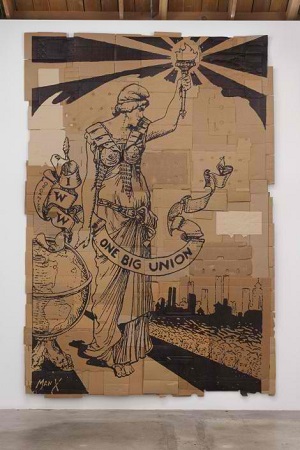
Andrea Bowers
American, 1965-
One Big Union, 2012
Marker on found cardboard
157 x 105"
Collection of the Museum of Contemporary Art San Diego
COMMENTS
Andrea Bowers’ new body of work is a Feminist-centric celebration of workers’ rights movements, highlighting nonhierarchical labor organizing strategies and the use of craft, artistry, and pageantry as valuable political tools. This show continues Bowers’ investigation of the intertwined relationships between feminism, immigration, and workers’ rights. By juxtaposing workers’ rights graphics from the early 1900s with contemporary political graphic campaigns, Bowers is asking us to evaluate our notions of emancipatory progress.
Bowers’ drawings are made from collaged found cardboard and sharpie markers. The material choices were inspired by a recent essay written by Gregory Scholette in which he states: “Meanwhile, Zuccotti Park and other OWS encampments revealed a mix of high-tech digital media and handmade signs, a mix of the archaic and the new as if beneath the Internet there is cardboard.”
- "Help the Work Along," Susanne Vielmetter Los Angeles Projects, Web, 8 September 2012
SBMA CURATORIAL LABELS
BORN 1965, WILMINGTON, OHIO
LIVES AND WORKS IN LOS ANGELES
Andrea Bowers addresses divisive issues in her overtly political work. From an early age she was exposed to union activity, which informed her thinking about unions as “crucial to the success of democracy.”
The title of One Big Union references the slogan of the Industrial Workers of the World (IWW), an organization committed to union policies representing all workers equally regardless of skill or trade. Its imagery is derived from the sheet music cover of a radical earlytwentieth-century workers’ anthem. The figure wears a Phrygian cap, a symbol of liberty dating from antiquity resurrected during the French Revolution. The artist links these historical precedents to the recent Occupy movement through her use of cardboard and permanent marker, materials for creating protest signs. The artist’s DIY (do-it-yourself) aesthetic emphasizes the significance of grass-roots protest and its connection to craft.
Also addressing labor politics is Bowers’s For My Transgender Sisters (May Day March, Los Angeles, 2012). Meticulously rendered in colored pencil from a photograph taken at a Los Angeles May Day march, the subject underscores connections among labor, immigration, and queer politics.
Labour and Wait, 2013
